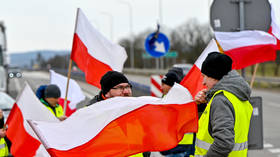“Afghan occupation has little to do with Afghanistan per se” – writer
American public support for the war in Afghanistan is at an all-time low, with July being the deadliest month for US and NATO troops since 2001.
With frustration growing about the occupation of the country, politicians in Germany have even suggested talking to the Taliban and terrorist organisations to avoid a further escalation of violence.
Speaking to RT, author of the best-selling book “Century of War”, Frederick William Engdahl indicated that the Germans can’t “quite understand” what the purpose of the entire war is.
He also spoke about his idea of the real reasons behind the conflict.
“The Afghan occupation – you have to understand – has nothing or very little to do with Afghanistan per se. It has to do with Russia, it has to do with China. It has to do with the Central Asian countries and spreading what some have called the "30-year War" scenario to prevent the independent economic development of Russia, China and Shanghai Cooperation states,” Engdahl told RT.
On Sunday, the commander of US and NATO forces in Afghanistan said he is not bound by the July 2011 date set for a troop pull-out.
General David Petraeus said he could well advise President Barack Obama not to go ahead with the pull-out if he believes it is the wrong time.
Investigative journalist Wayne Madsen says General Petraeus' comments are an indicator of Obama's policy, including those concerning the 2011 withdrawal.
“Petraeus has interviews with all the corporate media – you can’t have this general making public comments to the media without some sort of clearance from the White House,” Madsen told RT.
Meanwhile, President Hamid Karzai’s spokesman has said the president was planning to dissolve all private security firms in Afghanistan. The move could see some 25,000 security guards disbanded and entail a substantial change in the country’s security arrangement.
However, member of the Afghan parliament Daoud Sultanzoy believes the announcement is premature and those behind it are likely to regret making it.
“The president thought that the security companies are the problem. But I think it is not the security companies per se, but the poor management and poor implementation of the law. The president made a statement and now he is in a difficult situation,” Sultanzoy said.
Ivan Eland, director of the Center for Peace and Liberty at the Independent Institute, believes Hamid Karzai is targeting unregistered local warlords more than security companies.
“He is probably playing the nationalist card periodically because the US occupation of Afghanistan is unpopular with the people,” Eland told RT. “He may be using this as a front to get rid of a lot of big security companies that are Afghan and not foreign because they are like gangs.”
Ann Marlowe, a visiting fellow with the independent Hudson Institute think tank, claims that President Karzai may want a piece of the security contracting action for family associates.
"My angle is maybe Karzai is shutting down all of them in order to reopen ones belonging to his family," she told RT.Nathan Park, a contractor in Afghanistan, told RT that Afghan forces are not ready to provide security.












